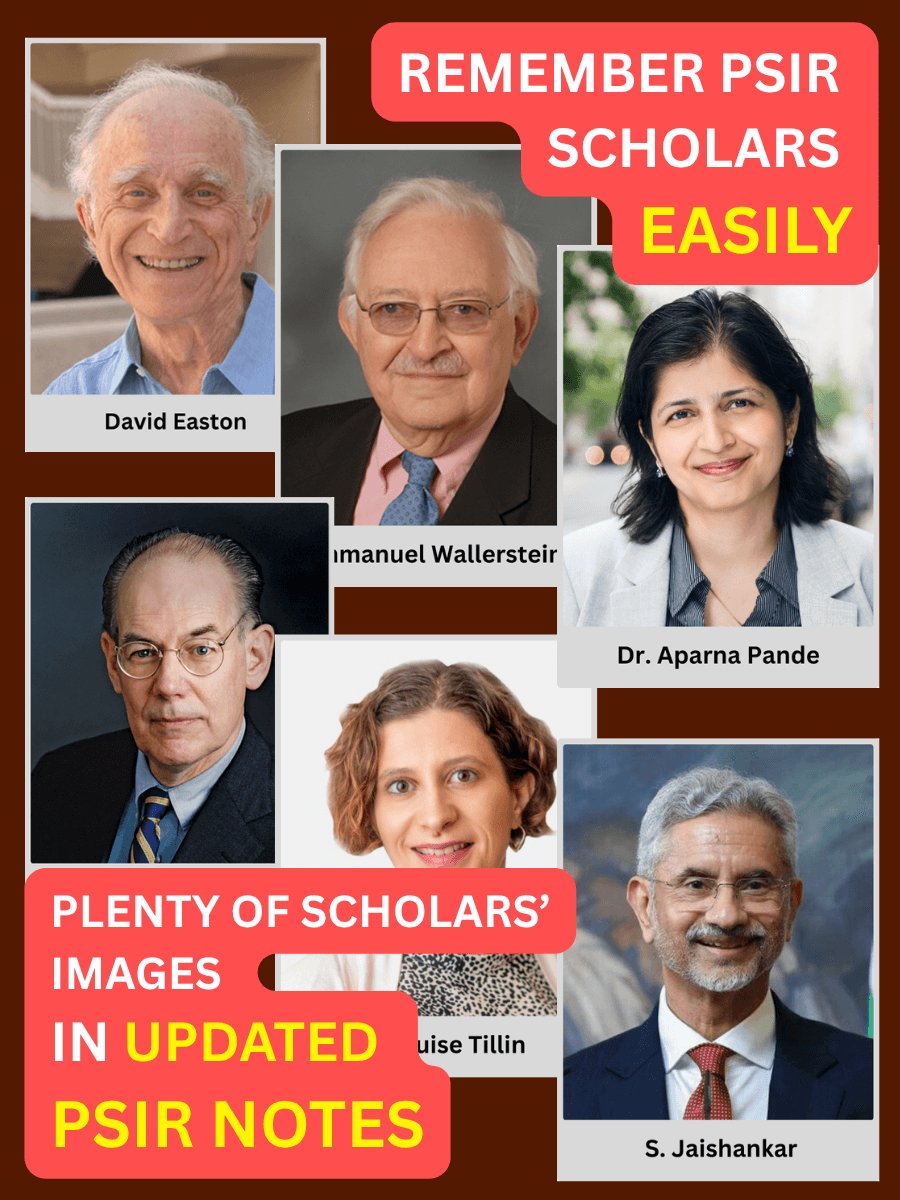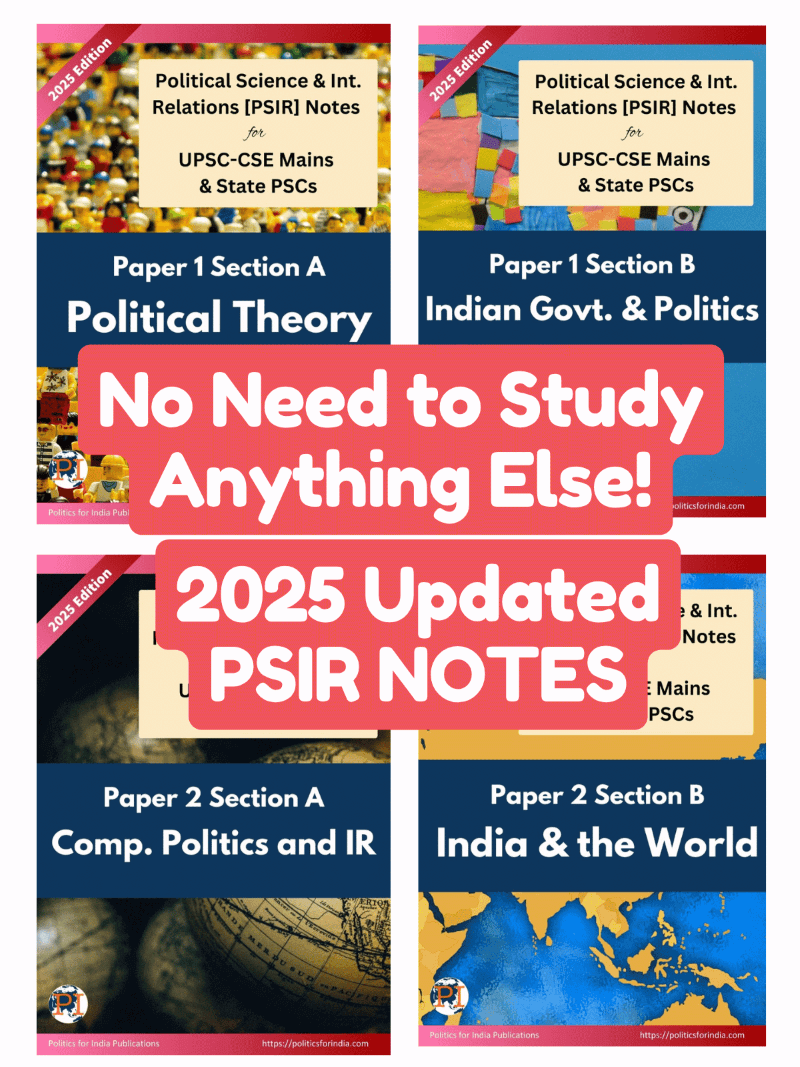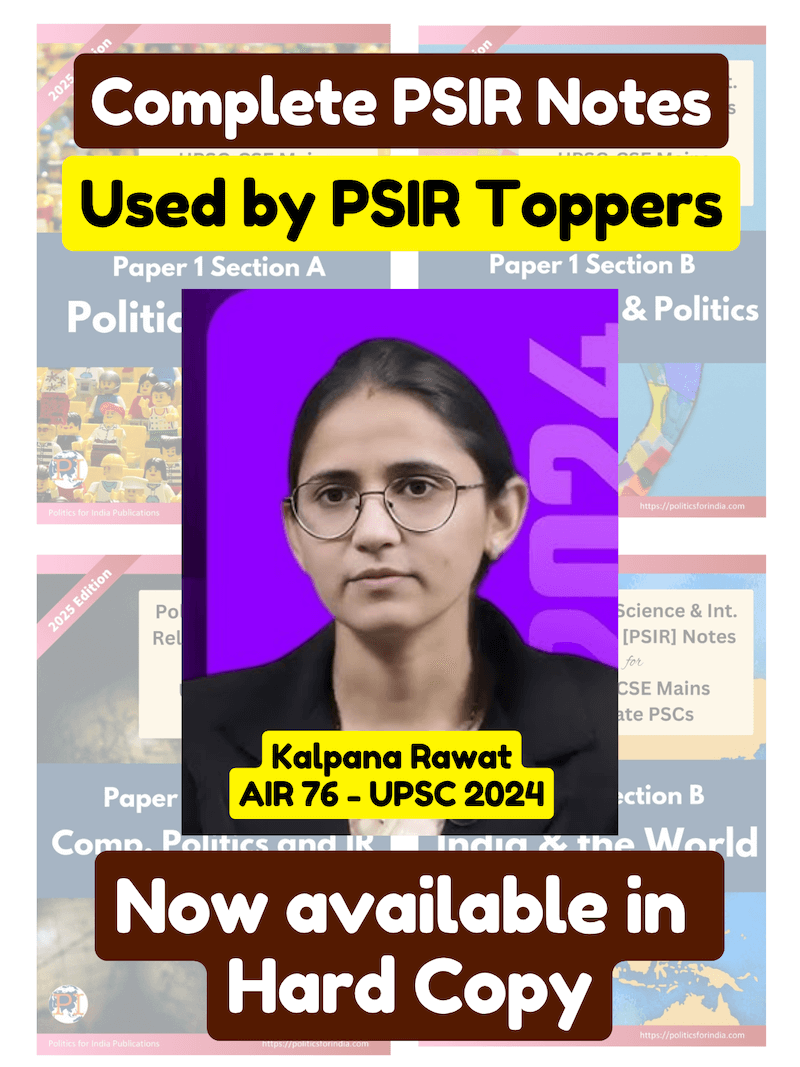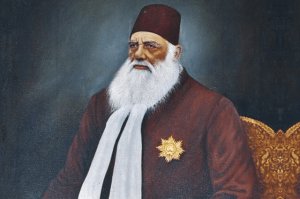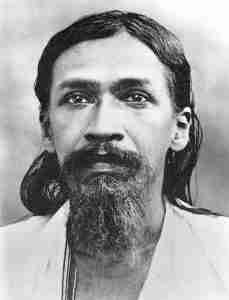1] The Concept of State
The concept of state can have varied meaning. We can begin with understanding what it is not. State is not a country, nor government nor nation. Country is a territorial entity, a geographical concept. Nation is more of an internal entity which resides in the minds of people. In the words of Sabine, nation refers to a unity of culture; a feeling of loyalty for a common land, common language and literature, identity of history and common heroes and common religion… Government on the other hand is a part of the state and not a state per se.
State can be defined as a legal and political entity, endowed with authority to govern the people. State usually exists in a country, but existence of country does not guarantee the existence of state. Unless country is independent, it is not a state. And state can exist with or without the feeling of nationalism.
A] Theories of Origin of State
1] Social Contract Theory
This theory suggest that state has evolved as a result of contract between man. It is not a natural institution, but a contractual entity. Hobbes suggest that there was no protection of rights of man before state, and therefore man enters into agreement. For the same reason, he suggests an overarching state with enormous powers. Locke, on the other hand suggest that the state is just an ‘additional safeguard’ to protect the rights of man & advocates minimal state.
2] Historical / Evolutionary theory
It suggests that state is not a deliberate creation of man, instead a natural development in course of history. Just like language, culture, customs developed, state also evolved and continues to do so even at present. The formation of state is a complex phenomenon, and should not be reduced to a single factor. Numerous small and big factors like social instinct, religion, force, kinship, economy, development etc. have played role in formation of state.
3] Marxian Theory
Marxists scholars like Engels argue that state is not natural. It was created at a point of time when society started dividing into two contending groups. It was created as an apparatus of a dominant class to protect their property and privileges and perpetuate the oppression of the marginalized section. And it would be better if humanity were to abolish the idea of state altogether.
According to Garner, political science begins and ends with the state. State represents authority or a system of governance. City State in ancient Greece evolved into Roman Empire, which in period of time changed into Nation State. And now we are witnessing even Supranational system (e.g. EU)
4] The Modern State
Territory, population, government, sovereignty etc. Sovereignty is the defining feature of modern nation state. Inherent in the idea of sovereignty is autonomy (internal and external), territoriality and centralization of authority.
B] Theories of Sovereignty
It is a modern concept, associated with the rise of modern nation state. Hobbes gave the first complete theory of the sovereignty of the state. Hobbes clearly established state absolutism. Ended the confusion of ‘two swords’, clearly defined that law is command of sovereign, it comes with the power of punishment.
1] Monistic Theory of Sovereignty
The monistic theory of sovereignty comes from Hobbes’s theory; hence it can also be called as Hobbesian theory of sovereignty. It led to the evolution of the monistic theory of sovereignty. The best exponent of the monistic theory is John Austin. Hence it is also known as Austinian theory.
Evolution of monistic sovereignty theory
Monistic theory emerged out of the experience of the medieval age where sovereignty was fragmented. It led to the chaos and hence the idea was accepted that on a particular set of people, living in a particular territory, the authority of state will be absolute. Neither any association outside the state (roman church) nor any associations inside the state (local churches or communities), can challenge the authority of the state. Hence the entire power in a defined territory got centralized at one place. Hence it is called as the monistic view.
The theory of sovereignty of state is closely associated with the theory of law. The monistic theory clearly established law as ‘command of sovereign’. It is because of this attribute Max Weber described modern nation state as an institution having monopoly over the use of violence in a particular territory.
One of the most acceptable definition of sovereignty (monistic theory) is given by John Austin.
”If a determinate (explicit/specific) human superior1, not in a habit of obedience to the like superior2, receives habitual obedience, from the bulk of the society3, then that human superior is sovereign and that society is a political society4… law is command of sovereign.’‘ – John Austin
- Determinate human superior: In medieval times, there was a confusion as to which authority is superior. Now it is clear that state is superior. Thus the characteristic of sovereignty is 1. Superiority and 2. Determination.
- Not in the habit of obedience to the like superior: It means sovereign does not obey any other sovereign. There is a difference between being a state which is sovereign and being a colony or dominion. There is no authority over the state. Thus the sovereignty means absolutism.
- Receives habitual obedience: State is an institution which majority respects because command of sovereign is law.
- Political society means state.
Thus the characteristic of sovereignty from the perspective of monistic theory is Determinate, absolute, inalienable or non-transferrable, permanence and enforceability.
Why monistic theory is not desirable?
It is threat to international peace. It concentrates too much power in the hands of the states, there is a fear of state becoming autocratic (anti-democratic). And it also does not give the real explanation of sovereignty.
According to Laski with emergence of federal form of govt. it has become ‘impossible’, misadventure to locate the sovereign. According to scholars like Duguit and Krabbe, state is not the only source of law, there are multiple sources of law, most important being customs and traditions (positive school of law vs sociological school of law). Monistic theory ignores the growth of international organizations and international law.
According to the historians like Henry Maine, there is no example in the history which can be put forward as an ideal example of Austin’s theory of sovereignty. Henry Maine cites the example of Raja Ranjit Singh of Punjab, who also could not exercise the sovereignty in the way Austin describes.
2] Pluralistic Theory of Sovereignty
Exponents – Laski and MacIver
Evolution
Monistic theory dominated till second world war. It was accepted that state has absolute powers, there are no limitations internal or external on the powers of the state, not even international law. Adherence to such ideas led to the recurrence of wars in Europe. The consequences of 1st and 2nd WW were unacceptable. Hence it was realized that there is a need to modify the theory of sovereignty. There is a need to give importance to international law and promote respect for human rights.
It has led to the experimentation of the ideas like European union. It has diluted the sovereignty of the state and transferred the power of decision making from the state to new supranational institutions beyond the state. Both after 1st WW and 2nd WW, there is an emergence of international institutions, international law and it was realised powers of the states have to be made limited. Thus emerged the idea of the pluralistic theory of the sovereignty
Pluralist theory is a rejection of monistic theory. According to monistic theory, power is to be concentrated at one place whereas according to pluralistic theory, power of the state should be distributed among different associations. According to pluralists state is an association like many other associations. Man has created various associations for fulfilment of his interest. State alone cannot fulfil all the interests of man. One of the best exponent of pluralist theory is Laski. According to Laski ‘since society is federal, authority should also be federal.’ Krabbe held that “The notion of sovereignty must be expunged from political theory.”
Philosophical basis of pluralistic theory of sovereignty.
Laski has given the philosophical basis. Universe is multi-dimensional. Man is a part of universe, so man is also multi-dimensional personality. Man has multiple needs, and hence man has created multiple institutions. State alone does not fulfil all the needs of man, hence other associations also deserve share in man’s obligation.
Types of Pluralists
A] Moderate Pluralists e.g. Laski
According to moderate pluralists, state is one of the associations among various associations. However state is more important than other associations. According to Laski, it happens because of the unique role played by the state. The role of conflict resolution. Which is also called as equilibrium maker. Hence for Laski state is the keystone of the social architecture. It means society cannot continue without state.
Problem in Laski’s ideas: On one hand he is skeptical with respect to the power exercised by the state. So he wants to limit the powers. Hence he says that “Since society is federal, authority should also be federal.” At the same time he realizes the importance of the state and is forced to accept that the state is the keystone of the social architecture.
B] Extreme Pluralists e.g. MacIver.
Extreme pluralists do not give any primacy to the state. For them state is just one of the associations. Who is MacIver? MacIver is a sociologist whereas Laski is a political scholar. Hence there is difference in their attitude. It is natural for Laski to give importance to the state.
According to MacIver there are many institutions and associations which are prior to state, not dependent on state for their existence e.g. Church. MacIver gives the concept of ‘service state’. According to him, state commands because it serves. It means state deserves the respect only when it fulfils the useful functions.
According to MacIver, state is both the guardian of law and the child of law. Means state’s purpose is to maintain law and order and at the same time, state is also under the law. State cannot exercise arbitrary powers. State powers are limited (the concept of rule of law).
According to MacIver, the ‘general will’ is not the will of the state, but will of the people for the state. It means It is misunderstood as if state enjoys ultimate powers. Totalitarian rulers misused the concept. The concept of general will does not give ultimate powers to the state. It gives ultimate powers to the people. It is people’s wish, which is expressed through the general will. State itself has to abide by the will of the people.
Critical evaluation of Pluralistic theory
Pluralistic theory is more realistic explanation. In the age of federalism and growth of multiple associations like UN, ICJ, EU, we cannot accept the monistic view that law is just the command of sovereign.
Monistic theory is relevant for jurists lawyers. It is a legal fiction. On the other hand pluralistic theory is sociological and political explanation
However, it is also inconsistent. They are against the state, but they do not eliminate the state [ this is also the major difference in anarchists and pluralists ]. When state exists, it automatically gains primacy over other associations. Thus state has to be recognized as higher than other associations rather than just like any other association. It is said that pluralists want to keep the cake and have it too.
Conclusion
Even when pluralism is inconsistent it does not mean it is irrelevant. Consistency is not the most important requirement of a sound theory. Pluralism is relevant because it is more realistic and more conducive for international peace.
C] Impact of Globalization on Sovereignty of States
Globalization is defined as borderless world or de-territorization.
Historically nation state has been a territorial concept. Nation states have been carved out of the Roman empire. The definite territory or border became the essential element. Sovereignty denotes the supreme power to make law lies with the state.
If nation state can be considered as a billiard ball with hard shell, the forces of globalization e.g. ICT (info. and comm. technology), Market integration, International Organizations, Int. laws, Global civil society etc. have made this shell porous / penetrable. Thus conceptually the territorial states and globalization are antithetical forces.
There is a lack of consensus among the scholars. Some believe that globalization has weakened the sovereignty, whereas others believe that state is in command of globalization. Hence we can analyse the impact on the basis of three perspectives.
- Globalists perspective: According to them globalization is real and it has diluted the sovereignty of the state, both internal and external.
- State Centric perspective: Globalization is on the losing end, the world continues to be state centric. States are controlling globalization.
- Transformationalists view: Globalization and sovereignty are not a ‘zero-sum game’. In some contexts state is winning and in some contexts globalization is winning.
Views of Sorenson: Globalization has not impacted all the states equally. Some are winning and some are losing.
Kenichi Ohame
In his book, The Borderless World, Kenichi Ohame argues that world is turning into global economy with political boundaries becoming less important. Due to development of ICT people are able to access lifestyles across the world and want best of everything. People want global products and governments are becoming more and more powerless in controlling it. This is true especially for developed countries like USA, EU, Japan.
Individuals have become global citizens because of their consumption habits – and government can no longer control consumption habits for fear of vote bank. Also, transnational companies no longer see themselves as rooted in one country. All this have eroded ability of governments to control economies.
He also argues that globalization of economy makes use of military forces less likely since economies have become interdependent. Slump in another economy will also affect country’s own citizens.
Role of state has been limited to producing conditions conducive for business and welfare activities in general
Criticism
It’s not true that countries cannot control their trades. Recent tariff increase by USA on imported goods from various countries is good example for this. With economies becoming interlinked governments across world might have reduced intervention in business but it does not reduce their power to do so.
USA, Russia, are using their military forces abroad too, contrary to what Ohame proposes.
According to global pessimists – he overstates power of consumers. While in reality, corporations and bankers have more power.
Susan Strange
According to her neither economist nor political thinkers have proper understanding of global financial market. Economist’s understanding is poor since they rely too much on economic models and don’t have proper idea of power. While understanding that of political thinkers is woeful. Since they only think in terms of power and politics. One needs a balanced approached. A study of both economics and political science to have realistic understanding.
2] Liberal and Neoliberal Theory of State
*[To avoid duplication, the content of this topic has been covered under is same as Liberalism section in Ideology (topic 8). Refer section 8 (Ideology-> Liberalism) for more details.]
Origin of the state: Social Contract theory.
Functions of the state: There are two schools of thought. 1. Minimal state (night watchman). 2. Welfare state.
Nature of the state: According to the liberals, state is the neutral arbitral / equilibrium maker in the society.
Implication: Everyone is equal in the eyes of state and people can expect justice from the state.
3] Marxist Theory of State
*[Study of this topic should be complemented with study of 10.7] Karl Marx, 10.8] Gramsci and 8] Ideologies -> Marxism ]
Marxism is a critique to liberalism; hence Marxist theory of the state is a critique of the liberal capitalist theory of the state.
Origin of the state : Force theory – state is not the result of the contract but state is the result of the subjugation of weak by the strong.
Functions of the state: Instrument of coercion. It works in the interest of capitalist class.
Nature of the state: State is not neutral but class institution. It protects the interest of the dominant class.
Theories of State in Marxism.
- Instrumentalists (Marx, Lenin, Ralph Miliband).
- Structuralist / relative autonomy (Marx, Gramsci, Althusser, Nicos Poulantzas).
A] Instrumentalist Theories
1] Karl Marx
Marx has analysed the nature of state in the advanced capitalist society. e.g. Britain. In the word of Marx “State is the executive committee of the capitalist class.” Executive committee shows that state implements the order. It means state does not even make laws.
State in capitalist society represent the dictatorship of minority and in socialism, the dictatorship of majority. Thus state is a class institution. State exists so long classes exist. State ‘withers away’ when classes end. In the words of Lenin ” State represent irreconcilability of class antagonism.”
It implies that state is not neutral arbitral, it is an instrument of dominant class. So long classes exist, state exist. The very existence of state show that class conflict cannot be resolved. Hence the only way to get justice is by revolution, capture the capitalist state.
2] Ralph Miliband
He has analysed the nature of the state in ‘post capitalist societies’. laissez fare capitalism is capitalism whereas, welfare state capitalism is post capitalism. Thus Miliband has analysed the nature of welfare state. THE NATURE OF STATE IN CAPITALIST SOCIETY.
He wanted to enquire whether welfare state has brought any significant change in the lives of poor/ working classes. He found that there is no qualitative change in the lives of poor even after the introduction of the welfare state. He analysed western liberal democracies and found that despite welfare state, there is an inequitable distribution of wealth. Wealth remains concentrated in the hands of few. Hence the class which controls the economic structure, continues to control the political structure.
According to him bureaucracy, judiciary in these states continue to be highly elitist. Hence the decision making continues to be in favour of rich. He has exploded the myth of ‘managerial revolution’.
Managerial revolution is a concept given by James Burnham which suggests that the nature of capitalism has changed. Originally power was with the capitalist class, but now the decision-making power in the industry has shifted to the managerial class. It is an open class. Persons belonging to any social background can become managers. Even the son or daughter of working class can be a manager, hence all the decisions in the industry are not necessarily only in the favour of capitalists.
According to Miliband, managerial revolution is a myth. It is extremely difficult for the sons and daughters of working classes to become managers until and unless they are exceptionally talented. Thus there is no change in the nature of capitalism, no change in the nature of state.
B] Structuralist Theory
State is not just the reflection of the base; state is also a structure in itself. It means state is not just an instrument, it may have relative autonomy from the base. It is not completely independent, only relatively independent. It suggests that, there are instances when a state may not act on the instructions of the capitalist class.
Marx has given the relative autonomy theory in his book THE 18TH BRUMAIRE OF LOUIS BONAPARTE. (Nephew of Napoleon Bonaparte). In this book, Marx has given the concept of Bonapartism: the state where executive is strongest.
Marx’s thesis of relative autonomy.
Nature of the state will be determined by the historical conditions. When capitalism is advanced, capitalists are organized, state becomes their instrument. However in some societies, a single class may not be controlling the entire basic structure e.g. Strong feudal class exists. Strong capitalist class exists. Workers are also organized. In such situations single class will not dominate. State ceases to be the instrument of a particular class. State becomes equilibrium maker among competing classes. Power will get tilted to whichever class state joins. It gives lot of bargaining power to the state.
Bonapartism
When a single class is not dominant, multiple classes are existing, it gives rise to Bonapartism. In such situation, no class alone is able to dominate the economic structure e.g. a country may have strong capitalist class, feudal class as well as organised working class. In this situation, single class will not be able to dominate.
In such situation, state gets leverage. State gets bargaining power over the classes. Since state gains bargaining power, it does not act as an instrument of a particular class. It goes for making strategic equations with different classes at different times. It gives the illusion of autonomy which means neutrality. State appears to be an equilibrium maker. [ Relative autonomy theory brings Marx’s theory near to the liberal view on the state.
Why state is not completely autonomous and only ‘relatively autonomous’.
Here comes the basic difference between Marxism and Liberalism. Marx continues to believe that economic structure is the basic structure. It implies that state is not fully autonomous. In normal situations state will appear neutral, but in crisis situations state will always intervene on behalf of the rich. Ex1. The state in West Bengal led by communist party, projected itself to be the protector of the interest of poor, however in case of people’s protests against Nano project, state ultimately used force on the people. The consequence has been communist party losing power and Mamata Banerji, could project herself as the protector of masses. Ex2. State under Obama in USA. Democrats are supposed to be pro-poor, however at the time of global financial crisis, state had bailed out the bankers whereas used force against people protesting against rising inequalities, in the form of the protest movement known as ‘Occupy Wall Street’ movement.
Nicos Poulantzas
Work: Political Power and Social Class
He has analysed the nature of states in western liberal democracies and concluded that welfare state in general does not exist as an instrument of a particular class because of,
1) Introduction of universal adult franchise i.e. Right to vote for poor.
2) Competitive party system – there is a cut throat competition in politics and each party has to maximise its support. Hence the manifesto of each party has something for every class. However Poulantzas also believe that state is only ‘relatively autonomous’. Why? Because in crisis situations state will ultimately favour the rich.
Althusser
Althusser has added multi-structural approach considered state as a structure. He gives the concept of interpellation, which is done through ‘ideological state apparatus’. There is a least resistance because of invisibility.
4] Pluralist Theory of State
*[ Refer pluralist theory of power and pluralist theory of democracy. (Topic 7: Theories of Power)]
Also do not get confused between pluralist theory of sovereignty given by Laski and pluralist theory of state given by Robert Dahl. There is difference between the two.
5] Postcolonial Theory of State
Which states are called as postcolonial?
The states which have been under colonialism – imperialism, commonly known as third world countries.
USA is not considered as a colonial state because, all postcolonial states are continuing with the legacy of colonialism described as neo-colonialism by the founding father of Ghana, Kwame Nkrumah.
What is colonialism?
Colonialism is a term of Marxist discourse. They defined imperialism as colonialism. At times, they also used the word ‘dependency’.
The main contribution to the theory of colonialism is of Lenin. It shows that the integration of the countries in the south with international economy does not help these countries. Third world countries should go for autonomous national development.\
Colonialism explains a situation of dependency, which denotes unequal exchange leading to uneven development. Prosperity at the core and poverty or the development of under-development at peripheries.
The nature of postcolonial states has been analysed by scholars from different perspectives. The two prominent perspectives are 1] Modernization perspective 2] Marxist perspective
A] Modernization perspective
This was given by western scholars, primarily World Bank economists. According to them, these countries will prosper if they are integrated with international economy.
Prominent scholars analysing the nature of the states in developing societies are F W Riggs and Gunnar Myrdal.
1] F W Riggs
F.W. Riggs – he has used the term ‘prismatic societies’ for these states. What does prismatic society denote? It denotes societies in transition. i.e. traditional societies moving towards modernization. He has given eight features of prismatic societies.
- Formalism: There is a big difference in theory and practice. Rules are modern, practice is traditional.
- Poly-communalism: Not yet a nation but different communities are co-existing. They are co-existing but don’t trust each other.
- Poly-normativism: Different norms are followed while formulating laws.
- Functional overlapping: It means lack functional specialization e.g. In most of the countries army and civilian administration is fused.
- Attainment norms: Either by birth or by achievement. (How one will get position.)
- Economic system: Bazaar Canteen model.
- Administrative system: Sala model – for some people system is based on rules and for some, on connections.
- Heterogeneity: Co-existence of modernity and tradition.
2] Gunnar Myrdal
Book – Asian Drama
Gunnary Myrdal is famous for the concept of soft-state used for India. He suggests that India will never be successful in eradicating poverty. Because India is a soft state. Soft state is a state which is unable to implement the laws. Soft on law-breakers.
India is a soft state, according to Gunnar Myrdal because:
- There is a corruption among bureaucracy and political class.
- Gandhian legacy. Indians have won independence through Gandhian methods, disobedience to law or as suggested by Ambedkar as Grammar of Anarchy. Since Indians won independence by disobedience to law, there is an inherent legitimacy for not obeying the authority.
- Indian culture – In India those persons are more respected to disobey the law rather than those who obey the law. The outcome of soft state is lawlessness and corruption. Failure to implement the developmental programs. He mentions about Pandit Nehru that even charismatic leaders like Nehru could not enforce the land reforms.
B] Marxist Approach
A] Instrumentalist Approach (Dependency Theories)
Given by the scholars of third world countries. Primarily Latin America and Africa. This theory is relevant to understand the nature of states in these regions. Even can be applied for middle east.
Exponents: A G Frank (LA), Sameer Amin (Egypt), Immanuel Wallerstein
They categorize state into two groups. – Core State, Peripheral state.
- These states are interlinked – they are interlinked because of capitalism becoming ‘world system’.
- Core countries are advanced countries – They reflect the concentration of economic power, political power, technological power, cultural power, military power… The states in core countries are the instruments of their bourgeoise class /capitalist class.
- Peripheral states – These states are in the state of ‘dependency’. Dependency denotes: a) unequal exchange. b) uneven development
5] As a result of dependency, there is a development of underdevelopment (poverty). These states are not autonomous, they are instrument of the states in core countries, which in turn are the instruments of their own bourgeoise class.
6] According to them, the only way these countries can achieve development is by de-linking themselves from the international economy controlled by core countries and focusing on ‘national autonomous development’.
B] Structural Approach / Relative Autonomy Approach
This theory for postcolonial states is given by Pakistani scholar. Hamza Alvi. His theory is applicable for the states in south Asia, particularly for Pakistan. According to Hamza Alvi, state in Pakistan is ‘overdeveloped’.
He believes that the instrumentalist theory will not be the right approach. The state in core countries can be called as the instrument of the bourgeoise class, however states in these societies cannot be called as an instrument of a particular class. Specific historical condition has made the states in these countries as autonomous, most powerful class in itself.
The power in these societies is concentrated in the state (executive/civil services). e.g. Pakistan can be called as ‘military-bureaucratic’ oligarchy. Similarly India was also known as ‘inspector raj’, though the change is taking place in India under the forces of globalization (rise of civil society and judicial activism).
Overdeveloped state is an evolution of modern nation state in developed countries
States in western countries are equally developed. This is with reference to basic structure. e.g. When it was a state society, it was city state. When economic structure became feudal, the nature of state also became feudal. When economic structure became modern (capitalist), state also became modern. Two principal characteristic of modern nation state are fixed territory and centralized authority.
In post-colonial societies, modern state has not evolved naturally. It has been an imported institution. Imported by the colonial masters. Hence there is a mismatch in the level of development. Economic structure (basic structure) remains traditional, political structure (part of super-structure) became modern. Hence political structure is overdeveloped in comparison to the economic structure. e.g. India China have been civilizational states. It was British who defined the boundaries of India and introduced centralized institutions.
We can use the term Bonapartism to describe the nature of overdeveloped state
Why Bonapartism? Colonial legacy. In order to protect the interest of the ‘raj’ colonial masters created a very powerful bureaucracy. Gave lot of discretionary powers along with protection (official secret act 1923). e.g. In India bureaucracy acted as ‘steel-frame’ of the raj.
Leaders after independence continued with the system. The party and the leaders which played the prominent role in the freedom struggle came to power. They enjoyed lot of legitimacy in the eyes of the people hence people didn’t question their methods.
These states followed stateless developmental model. It has resulted into the concentration of wealth in the hands of executive and civil servants. Hence above factors in combination made state the most powerful class.
According to Hamza Alvi, the state in Pakistan bargained with 3 classes: 1) Indigenous feudal class, 2) Indigenous bourgeoise class, & 3) Metropolitan bourgeoise.
6] Feminist Theory of State
*[Also refer feminism in ideology topic (topic 8) for more details on the topic.]
According to Catherine MacKinnon ‘there is no feminist theory of the state’. Feminism study ‘power’. They study ‘patriarchy’ and how patriarchy results into the subordination of woman as well as exploitation. For feminists ‘personal is political’ which shows that state is an instrument of patriarchy. According to MacKinnon ‘when I look at the state, state appears male to me’.
Feminists have ambivalent attitude towards the state. On one hand they believe state as an institution of patriarchy, on the other hand, they believe that only state can improve the status of women. Iris Mariam Young has given the concept of differentiated citizenship which justify affirmative action by the state in favour of women.

